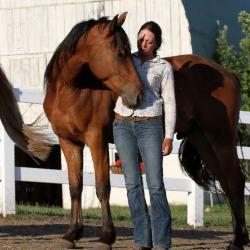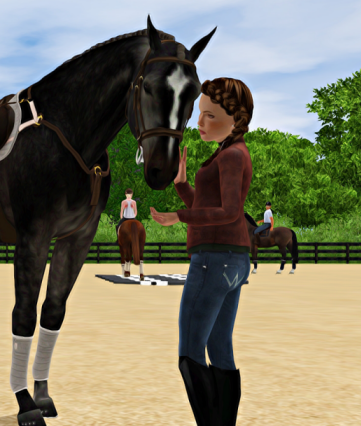
Amy Skinner
Editor’s Note: Amy Skinner is a regular guest columnist and has been a horse gal since age six. Read her most recent article on the questionable nature of the 30-day start. She will present an arena demonstration with fellow trainer and rider, Katrin Silva, at the Best Horse Practices Summit.
This week, we asked Skinner to relate some horse world issues that she’s encountered and that relate to the Best Horse Practices Summit Stepping Up workshop sessions. Learn more about Stepping Up.
She rides and teaches dressage and Western. Skinner has studied at the Royal Andalusian School of Equestrian Art in Spain, with Buck Brannaman, Leslie Desmond, Brent Graef, and many others.
Amy Skinner writes:
It’s 2018 and men are telling me to quit complaining, because I already have all the rights I could need. Yet I still live in a world where men eye me and say I couldn’t possibly start their horse because I am too delicate, and their horse needs a little more “rough and tumble” to get the job done.

Can we move towards greater gender equality in the tradition-rich horse world?
Men can take the cheap seat on the fence while I come off bronc-y colts, and brush it off with “after all, you are a girl,” instead of wondering what’s missing in the horse’s preparation.
I’m still told to “man up” and “grow a pair” if I don’t think a horse is ready to ride yet. In 2018, I still hear comments on my body and not my ability. While busy fixing fence, I’m told to smile because it makes me look prettier. When covered in dirt and sweat from a day’s work, I’m told to dress up more or put on some makeup, otherwise my boyfriend will look elsewhere. I still live in a world where men try to intimidate me when I’m alone, but are friendlier and easier to deal with when my boyfriend is around.
Women, too, show signs of bias. I’ve often found that between me and a male trainer of equal or lesser ability, women feel more confident with the male trainer. Women can struggle to listen to or take advice from other women and are quick to think that men are more capable. Some women feel better about paying a high rate to a man, yet they may feel a fellow female is over-assessing her worth. I’m just learning that this unconscious bias has been verified through research. Read more about that here.
It’s not all this way, though. I’ve worked hard on my education, and while there are some horsemen and women who still view the world through a sexist lens, I’ve had the honor of working with plenty of good hands who saw ability and not my gender.

Women in the horse world. It’s complicated and knotted with historical biases
It’s been my experience that the horsemen and women who truly cared about the horse’s wellbeing, who really had an innate understanding of the horse, didn’t care one bit what you looked like or who you were. Everybody in the horse world spouts the horse has no ego, but the real horseman knows how to keep his or hers in check, and a real hand doesn’t see anything but what’s inside you and what you’re putting out to the horse.
I continue to work toward bettering myself and learning all I can, and I choose to surround myself with people participating in bettering the world. We may have some struggles but the world is changing, and fortunately for us women, strength is going away as a necessary tool in the horse training game.
We can’t turn a blind eye to sexism, but we can’t quit plugging ahead, working on bettering ourselves and keeping our own egos in check. That is how we make the world a better place – not by complaining, but by doing. I get up each day and work with horses in the way that I can, learning from my mistakes and striving always to find a better path to softness. After all, I am a girl.
Bravo!!!! Well said. You are inspiring, Amy Skinner.